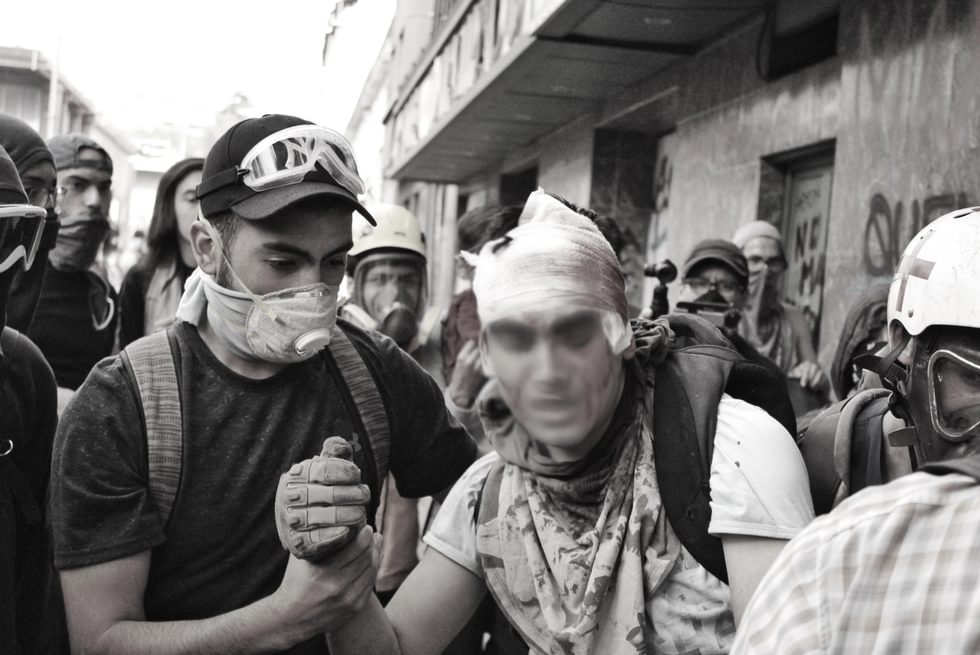
No sintai miedo, si gracias a la Primera Línea nosotros podemos marchar. Si no fuese por ellos, no existiría la marcha.
—Stefan Kramer
“Don’t be afraid, it’s thanks to the First Line that we can march. If it weren’t for them, there would be no march.” This phrase was part of the comic routine of Stefan Kramer in arguably the most important cultural event of Chile, the Festival de Viña del Mar, in February 2020. This small homage to the Primera Línea—First Line, the spontaneous groupings of people that reject police advancements during demonstrations—gathered applause and joined a series of other expressions of respect and admiration for those that have spent several months on the streets of Chile since October 18, 2019, keeping the police away from protestors and supporting the injured.
Only a couple of weeks later, when the Covid-19 pandemic started to be taken seriously in public conversations in Chile, many of the first aid groups started to make calls for people to stay at home rather than meeting each day in the (newly renamed) Plaza de la Dignidad, Dignity Square, the epicenter of protesting in the capital, Santiago. Moreover, in recent days several twitter posts show members of the #PrimeraLinea—many of them organized as affinity groups— disinfecting and cleaning public transportation, wearing the same masks that have become the necessary protective gear for anyone demonstrating in the streets and trying to survive heavy tear gassing or shooting by the police. The president of the Colegio Médico (Chile’s medical union), Izkia Siches, has also referred to frontline medical workers as the “new” #PrimeraLinea when making calls for people to stay home.
The public gatherings and demonstrations that had been overflowing different regions of Chile were abruptly cut short by the rapid surge in Covid-19 cases and multilateral calls to stay at home. A new state of constitutional exception was decreed on March 18th, and the military were taking to the streets, a déjà vu of the week-long state of exception lived in October 2019. The referendum for a new constitution, a much expected event originally planned for April 26th, was postponed until October. In this sudden interruption, the language of the First Line tells us something about struggles for dignity, either strictly “revolutionary” or not. The image of a First Line has been easily adapted to the new context because the main functions of those who embody it have the same critical task: care.
The original First Line, which emerged spontaneously in the first days of protests in October 2019, had been labelled by government authorities as “criminals” and “violent”—with several incarcerated for clearly exaggerated charges. But it was, simultaneously, the most praised group by anyone taking part in the demonstrations. In my personal experience while taking part in demonstrations in Santiago, the location of the First Lines would indicate where it was safe to be. Often I saw them carrying injured people to first aid points and shielding vulnerable passersby from the relentless and brutal attacks the police unleashed on us.
Health workers—including doctors, nurses, and orderlies—have been at the front of public forms of appreciation worldwide. The pandemic has given us a unique opportunity to reconsider how fundamental their work is. But how do we take care of the carers? Is it enough to clap for them? Probably not. This pandemic has found most, if not every public health service already worn down after a decade of global austerity, with some places like Chile carrying the damage of structural adjustment and neoliberalization for more than four decades. In this context, the work of those tending the bodies of the sick and vulnerable becomes an existential concern.
Society can be defended “against the state” in the form of a revolt that points at the illegitimate use of violence (cf. Clastres 1989) or against a virus that attacks our biology directly. In both cases the First Line provides a fundamental buffer of care to allow us all to continue living. The fact that the government has tried to criminalize the original First Line as they reorganize to help clean up public spaces adds to the mounting evidence of a deep divide and political breakup between institutionalized politics and Chilean common sense that might resemble political crisis elsewhere.
Care has been a key concern in anthropological thinking in recent years. Here I am drawing from a broad understanding of care as intimately related with freedom. To understand what form of labor care is, I suggest the definition of “any labor that is directed at maintaining or enhancing another’s freedom” (Graeber 2018). This definition helps us to make sense of both First Lines as they each contribute to not being (s)cared and able to engage in creative actions and the things we value as ends in themselves. The shift from those who were looking after us on the streets to the new dangerous front of the SARS-CoV-2 virus shows once again that the work of care is deeply political. Beyond just providing us with “basic needs” in the instrumental sense, care plays a fundamental moral and political role in allowing us to transcend mere survival; it allows us to make significant decisions on how we want to live.
Vanguards have historically played a role in caring for others to make political acts of dissent possible. Still, this unprecedented acknowledgment of the First Line brings a deeper understanding of the origin and meaning of such discontent. In Chile, as elsewhere, institutional politics have been suspended, but the politics of care continue. Who we recognize and praise as carers can give us hints of what is precious to us as a collective; a clarity much needed in the times of Covid-19.
References
Clastres, Pierre. 1989. Society against the State: Essays in Political Anthropology. Translated by Robert Hurley and Abe Stein. New York: Zone Books. Originally published in 1974.
Graeber, David. 2018. “The Revolt of the Caring Classes.” Grande conférence, Collège de France, March 22.